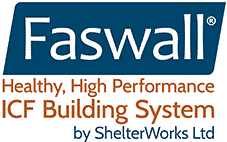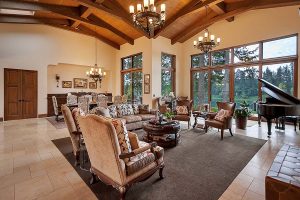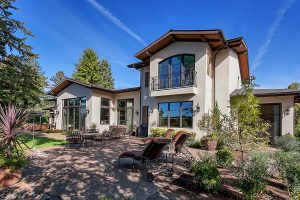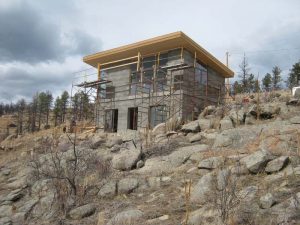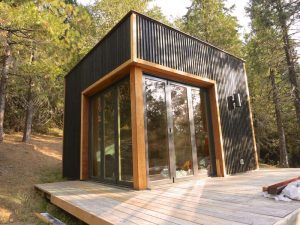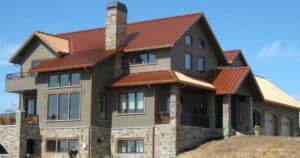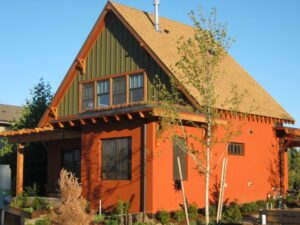Whether you’re starting a new home build, or looking to add sustainability to an existing structure, making sure your home is code-approved is essential for preventing hardships down the line. Using sustainable, high-performance building materials, eco-friendly home designs, and eco-efficient technology can offer a variety of homeowner benefits. These benefits can increase the value of your home, decrease your energy spending, and save money on utility bills and expenses. However, while creating your project, it is essential to keep in mind the building codes and zoning laws you must follow in order to build a sustainable home that’s also up to code.
But first, let’s discuss some common sustainable homeownership questions so you can be sure to maximize your project’s value.
Common Questions
What Makes A House Sustainable?
The first key to planning a sustainable home project is understanding how to define sustainability. A sustainable home lowers its impact on the environment by using resources and materials in the most efficient way possible. Eco-friendly house ideas like energy-efficient homes, net-zero homes, and passive homes are all viable design options you could choose to incorporate into your home project. Whatever concepts or designs you decide on, making sure your project has optimal impacts on the environment, energy, power, and resources are essential to having a sustainable eco-friendly home build.
What Are The Three Key Elements of a Sustainable Home?
- Sustainable materials
- Eco-conscious design
- Efficient technology
Whether you’re building walls, foundations, or more, Faswall’s eco-friendly building material is a top choice for innovative, green home builders looking to optimize the value of their projects. Made with non-toxic, recycled materials, Faswall blocks help lower your home’s carbon footprint while also providing superior energy-efficient technology. From their high thermal mass design to their insulative qualities, Faswall helps reduce your home’s energy needs compared to traditional insulated concrete form (ICF) block construction.
Does It Cost More To Build a Sustainable Home?
When compared to other foam ICFs on the market, Faswall’s high-performance building material provides bigger financial and environmental value than many other competitors. When making a plan, it is important to consider your renovation budget, whether you are upgrading your current home or building a new one. Knowing your credit for buying a house is essential when planning your budget and gives you an idea of how much you can afford.
Sustainable Upgrades
There are several aspects that are important to consider when choosing which home improvement projects to undertake. Checking in with your credit can give you insight into what kind of home improvement loans are available to you. Investing in these improvements can not only decrease your energy costs but make you eligible for tax credits. Energy Star has a database of tax credits that can allow you to keep your finances in mind when planning your project.
Next, it is important to decide what renovations will suit your home and lifestyle. These may include:
- Insulation
- Natural ventilation
- Upgrading materials
- Renewable energy sources
- Energy-efficient windows
This list is not exhaustive, but it should give you an idea of the vast options available for sustainable home improvements. As you can see, some of these improvements are minor, while others require extensive renovation. When doing home renovations, remember to consider building codes and zoning laws in your area.
Understanding Building Code & Zoning Laws
When making improvements to an existing home, or planning a new build, you will need to consider building codes and the zoning laws in your area. Building codes make sure that a home is safe and secure for its occupants. Building code compliance can be one of the more confusing aspects of a renovation project, and understanding what requires approval and how to achieve compliance cannot be understated. First, you must know what approvals you need. Green building certifications are not a requirement when renovating your home, even if sustainability is your goal. These certifications provide guidelines and toolkits for making sure your home is environmentally friendly and energy-efficient, but they are not legal requirements.
When Is Adherence Required?
Building codes are a set of rules that outline standards for constructed objects, which cover the construction, design, maintenance, and additions to structures. These codes are created to be clear regulations for the minimum safety requirements for structures, to ensure the safety of occupants and the surrounding community. The International Code Council, or ICC, is the body that sets the standard for building codes, and most municipalities adopt elements from ICC codes, rather than creating completely unique laws for each area. On the other hand, zoning laws regulate how certain spaces are used. Zoning laws divide areas into residential, commercial, and industrial zones. The zoning laws that govern residential areas affect the types of structures, additions, and materials used on your residential property.
Faswall meets or exceeds building and energy codes in all states. Suppose your local building department is not familiar with Faswall® ICF’s 25-year history in North America. In that case, we can provide the necessary professional listings and testing data to assist in gaining the required approvals. Our staff has many years of experience in providing guidance and direction regarding engineering and structural solutions.
Completing any home improvement project requires planning, knowledge of local codes, and a vision for the finished project. Adding the increased standard of achieving sustainable outcomes can seem like a daunting task, but armed with the knowledge of green construction, you can plan improvements that are compliant with local regulations, all while increasing your home’s value and decreasing energy costs.
